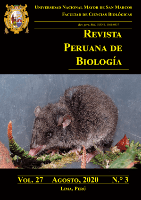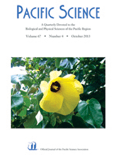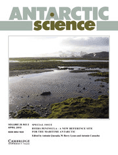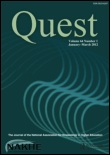
Czech Polar Reports
Scope & Guideline
Unveiling Ecological Dynamics in Polar Regions
Introduction
Aims and Scopes
- Ecological and Biological Research:
The journal frequently publishes studies on the ecological dynamics, species interactions, and biodiversity within polar ecosystems, including flora and fauna adaptations to extreme conditions. - Climatology and Environmental Monitoring:
Research on climate change impacts, atmospheric conditions, and environmental monitoring techniques, particularly in relation to polar climates, is a core focus area. - Geoscientific Studies:
The journal includes contributions related to geological formations, geochemical processes, and the effects of volcanic activity in polar regions, providing insights into earth sciences. - Innovative Methodologies:
Czech Polar Reports promotes the use of advanced methodologies, such as remote sensing, molecular techniques, and machine learning, to enhance research in polar sciences. - Conservation and Human Impact:
Papers addressing the impacts of human activities, including tourism and invasive species, on polar ecosystems are essential, highlighting conservation strategies and ecological resilience.
Trending and Emerging
- Climate Change and Its Ecological Impact:
Increasing attention is being paid to the effects of climate change on polar ecosystems, including studies on glacial retreat, temperature fluctuations, and their implications for biodiversity. - Technological Innovations in Research:
The use of advanced technologies, including deep learning and remote sensing, is becoming more prevalent, facilitating more accurate data collection and analysis in polar research. - Microbial and Plant Resilience Studies:
Emerging research on the resilience of microbial communities and plant species in extreme conditions is gaining traction, reflecting a greater understanding of adaptation mechanisms in polar environments. - Interdisciplinary Approaches to Biodiversity Conservation:
A growing emphasis on interdisciplinary studies that integrate ecological, geological, and climatological perspectives highlights the importance of comprehensive conservation strategies in polar regions. - Human Impact and Invasive Species Research:
As human activities increase in polar areas, research on the effects of invasive species and tourism is becoming increasingly relevant, focusing on ecological balance and resilience.
Declining or Waning
- Traditional Taxonomic Studies:
Research focused solely on taxonomic classification of polar species is less frequent, possibly due to a shift towards ecological and functional studies that emphasize species interactions and ecosystem roles. - Historical Climate Data Analysis:
Papers analyzing historical climate data without a contemporary relevance or application appear to be waning, as the focus shifts to real-time monitoring and predictive modeling. - Laboratory-based Physiological Studies:
While physiological studies are still relevant, there is a noticeable decline in those conducted in controlled laboratory settings, in favor of field studies that assess organisms in their natural environments.
Similar Journals

REVISTA PERUANA DE BIOLOGIA
Connecting Researchers to the Heart of Biological DiscoveryREVISTA PERUANA DE BIOLOGIA, an esteemed journal published by the Universidad Nacional Mayor de San Marcos, Faculty of Biological Sciences, has been a vital platform for disseminating significant biological research since its inception in 1974. With an Open Access model, this journal ensures that high-quality research is freely available to readers across the globe, fostering the advancement of knowledge within the field of agricultural and biological sciences. Despite proprietary challenges, the journal has secured a respectable Q3 category ranking in Agricultural and Biological Sciences and currently holds a 137th rank in Scopus among its peers. By embracing a comprehensive scope, REVISTA PERUANA DE BIOLOGIA encourages submissions that contribute to diverse biological topics, making it an essential resource for researchers, professionals, and students looking to enhance their understanding and expertise. With its ongoing commitment to excellence, this journal remains a cornerstone of biological research in Peru and beyond, reinforcing the importance of collaboration and knowledge sharing in the scientific community.

PACIFIC SCIENCE
Illuminating the Pacific: Where Science Meets SocietyPACIFIC SCIENCE is a prestigious multidisciplinary journal published by University of Hawaii Press, dedicated to advancing knowledge across diverse fields of study related to the Pacific region. With a robust ISSN of 0030-8870 and an E-ISSN of 1534-6188, this journal serves as a vital platform for researchers, professionals, and students to disseminate and access influential research findings that contribute to the understanding of ecological, cultural, and social dynamics in the Pacific. The journal has steadily maintained its relevance since its inception in 1947 and features a commendable Scopus Rank of #74 out of 171 in the multidisciplinarity category, placing it in the 57th percentile of its field, and is recognized as having a Q2 quartile ranking in 2023. Although lacking open access options, PACIFIC SCIENCE offers in-depth analysis and scholarly discourse, effectively bridging various disciplines to foster collaboration and innovation. With its commitment to high-quality research and its significant impact on Pacific studies, the journal continues to play an important role in informing policy, conservation efforts, and community engagement within this vital region.

EXTREMOPHILES
Pioneering Research on Life’s ExtremesEXTREMOPHILES is a distinguished academic journal published by SPRINGER JAPAN KK, focusing on the fascinating and diverse field of extremophile research. With its ISSN 1431-0651 and E-ISSN 1433-4909, this journal serves as a vital platform for scholars interested in the adaptations and possibilities of life in extreme environments. Since its inception in 1997, EXTREMOPHILES has significantly contributed to advancing the understanding of extremophilic organisms and their applications across various disciplines, as evidenced by its respectable rankings—holding a Q2 category in both Medicine (miscellaneous) and Microbiology, and a Q3 in Molecular Medicine as of 2023. Researchers and professionals in the fields of microbiology, biochemistry, and molecular medicine will find this journal an essential resource, providing insights into the mechanisms of extremophiles and their biotechnological implications. Despite not being open access, its comprehensive scope and rigorous peer-review process ensure that only high-quality, impactful research reaches its readers. For anyone eager to delve into the secrets of life in extreme conditions, EXTREMOPHILES stands as a premier journal worthy of attention.

ANTARCTIC SCIENCE
Fostering Global Dialogue on Polar ResearchANTARCTIC SCIENCE is a premier journal dedicated to the multidisciplinary study of Antarctica, encompassing its ecology, geology, and oceanography. Published by Cambridge University Press, this journal provides a vital platform for researchers, professionals, and students eager to explore the complexities of polar science. With an impressive Scopus ranking placing it in the 70th percentile for geology and 65th for ecology, ANTARCTIC SCIENCE stands out as a Q2 journal in both Ecology, Evolution, Behavior and Systematics and Oceanography categories, reflecting its significant impact in the field. The journal invites submissions that contribute to the understanding of Antarctic environments, wildlife, and climatic changes since its inception in 1986. While not openly accessible, it presents rich accessibility options for institutions and researchers, making cutting-edge research available to its audience. Join the global conversation in advancing polar research and understanding at ANTARCTIC SCIENCE.

Journal of Oceanology and Limnology
Bridging Disciplines for a Healthier PlanetJournal of Oceanology and Limnology, published by SCIENCE PRESS, is a premier academic journal dedicated to advancing the fields of oceanography and limnology. With an ISSN of 2096-5508 and E-ISSN 2523-3521, this journal has emerged as a vital resource since its inception, aiming to disseminate cutting-edge research and comprehensive studies on aquatic environments. Based in China and indexed with notable rankings in Scopus, including a Q2 category in Oceanography and a Q3 category in Water Science and Technology, this journal significantly contributes to knowledge in these crucial scientific disciplines. The H-index for the journal is currently being established, reflecting its evolving impact within the academic community. Moreover, the open access model promotes wider dissemination, ensuring that research findings are accessible to a global audience. Covering a diverse range of topics from ecosystem health to climate impact on water bodies, the Journal of Oceanology and Limnology aspires to foster interdisciplinary dialogue and innovation among researchers, professionals, and students engaged in understanding and preserving aquatic life.

Geofisica Internacional
Pioneering Insights in Geophysics and Energy StudiesGeofisica Internacional, an esteemed academic journal published by the Instituto de Geofísica at UNAM, Mexico's prestigious National Autonomous University, has been a pivotal platform for advancing the field of geophysics and energy studies since its inception in 1975. This Open Access journal aims to disseminate high-quality research findings, making significant contributions to our understanding of Earth's processes and energy resources. With a current impact factor that situates it in the Q3 category for both Energy (miscellaneous) and Geophysics, it provides a continuous dialogue for researchers, professionals, and students interested in the intersection of these critical areas. Based in Mexico City and publishing articles that span various geophysical disciplines, Geofisica Internacional is indispensable for anyone seeking to stay at the forefront of environmental and energy research.

Frontiers in Remote Sensing
Leading the way in open-access remote sensing scholarship.Frontiers in Remote Sensing is an innovative open-access journal published by FRONTIERS MEDIA SA, dedicated to advancing the field of remote sensing through high-quality research and groundbreaking studies. Launched in 2020, this journal has quickly established itself as a pivotal platform for scientists and researchers working in the spheres of Physics and Astronomy and Biochemistry, Genetics, and Molecular Biology. With impressive rankings in Scopus, including a 68th percentile standing in Physics and Astronomy, it provides a vibrant forum for discussions on new methodologies, applications, and technological advancements in remote sensing. The journal is committed to facilitating knowledge dissemination by providing fully open access to its content, ensuring that useful scientific insights are readily available to a global audience. As it converges towards its initial evaluation period (2020 to 2024), Frontiers in Remote Sensing aims to solidify its role as a key resource for researchers, professionals, and students looking to innovate and excel in this dynamic field.

FOREST SCIENCE
Connecting scholars and practitioners in forest science.FOREST SCIENCE, published by Oxford University Press Inc, is a pivotal journal in the field of forestry and ecological modeling, boasting an impressive track record since its inception in 1970. With an ISSN of 0015-749X and E-ISSN 1938-3738, the journal provides a valuable platform for the dissemination of high-quality research and studies that address contemporary challenges in forestry and ecology. It ranks in the Q2 category for both ecology and forestry and holds a Q3 ranking in ecological modeling according to the latest evaluations, illustrating its significant contribution to these fields. The journal is accessible through various options, facilitating broad readership and engagement within the academic community. As part of its commitment to advancing knowledge and practices in forest management and conservation, FOREST SCIENCE seeks to bridge theoretical research with practical applications, making it an indispensable resource for researchers, professionals, and students alike.

QUEST
Connecting theory and practice in sport and educational research.QUEST is a distinguished academic journal published by Routledge Journals, Taylor & Francis Ltd, focusing on the intersection of education and sports science. Established in 1963, this peer-reviewed journal has built a commendable reputation, currently ranking in the Q1 category for Education and Q3 for Sports Science, showcasing its significant contribution to these dynamic fields. With a Scopus ranking of #311 out of 1543 in Social Sciences - Education, QUEST is recognized for its impactful research, embodying a 79th percentile rank that reflects its relevance and quality. The journal seeks to advance the understanding of teaching and learning across various contexts, making it an invaluable resource for researchers, professionals, and students alike, who are engaged in exploring the pedagogical implications of sport and physical culture. Be a part of the ongoing dialogue in education and sports science by accessing the latest in groundbreaking research and innovative practices through QUEST.

Nature Conservation Research
Driving impactful research for ecological resilience.Nature Conservation Research is a prominent open-access journal that has been dedicated to advancing the field of conservation science since its inception in 2016. Published by the SARANSK FOND PODDERZKI & RAZVITIA ZAPOVEDNYH in the Russian Federation, this journal serves as a vital platform for researchers, professionals, and students alike, providing critical insights into ecological and environmental issues. With an impressive impact factor and ranked in the second quartile across multiple categories—including Agricultural and Biological Sciences, Earth and Planetary Sciences, Ecology, and Nature and Landscape Conservation—Nature Conservation Research stands at the forefront of impactful scientific discourse. The journal not only aims to disseminate high-quality research findings but also seeks to foster collaboration and innovation in conservation practices globally. By ensuring open access to its content, it promotes widespread dissemination of knowledge, crucial in the fight against biodiversity loss and environmental degradation. Researchers and practitioners contributing to the journal will find themselves at the convergence of science and conservation efforts, paving the way for sustainable ecosystem management.